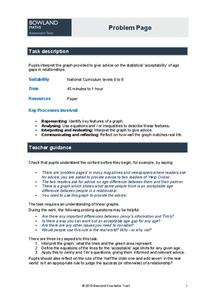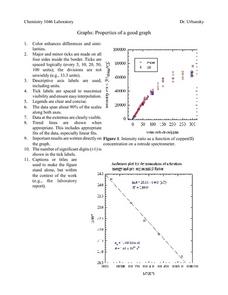WITS Program
Whoever You Are
Deep down, everyone is the same. Discuss the similarities and differences between people across cultures with a series of reading activities based on the beautiful story and illustrations in Whoever You Are by Mem Fox.
Super Teacher Worksheets
Accept and Except
Accept and except: although these two words sound similar, their meanings are very different. With a 10-question worksheet, grammar enthusiasts prove their understanding of the two commonly confused words by reading...
San José State University
Commonly Misused Words
After reviewing two pages of commonly misused words: effect/affect, accept/except, there/their/they're, etc., learners must choose the proper word in ten different sentences. Note: Answers are listed at the bottom of page three.
Curated OER
Accept/Except
In this confusing words worksheet, students review the meanings of the words accept and except. Students then read examples of using the words correctly.
Curated OER
Acceptance Sampling
In this algebra lesson plan, students sample food and identify acceptance sampling. They create specific plans to meet specific situations as they sample the food. There are 6 questions.
University of New Mexico
Educating Culturally and Linguistically Diverse Students
Three mini units make up one large unit designed to explore multiculturalism and encourage cultural identity. Each lesson sparks thoughtful discussion, critical thinking, and are equipped with activities and assignments geared to...
Learning for Life
Race, Religion, and Culture
Accepting others as individuals regardless of differences in appearances, languages, and interests is an important life skill for youngsters to acquire. The activities provided in this resource will support learners as they explore the...
Curated OER
Relationships for Students in Middle School
Boundaries are important in relationships, no matter how close the relationship is. Middle schoolers explore the ideas of boundaries and personal space with two units about relationships. After discussing the boundaries in their own...
Curated OER
Halves, Thirds, and Sixths
An excellent activity that effectively pulls together the concepts of area, fractions, and equivalent fractions! Using 3x2 rectangular arrays, 3rd graders are introduced to the concept of area in terms of square units. Building on this...
Bowland
Problem Page
Future mathematicians use a given graph to answer a question about age differences in relationships. Along the way, they must find the equation and inequality of given graphs.
Curated OER
Homophones
Pare, pair, or pear? Learners explore homophones with this dictionary skills learning exercise. They look up definitions to five sets of homophones to see how words can sound the same but have completely different meanings. There are...
Curated OER
Conjunctions Worksheet
Help your early elementary learners write complex or compound sentences using conjunctions. They use the listed conjunctions to combine five different sentences. They then use the space provided to compose a complex sentence of their own.
Illustrative Mathematics
Mixed Numbers with Unlike Denominators
There is more than one way to add mixed numbers. This worksheet asks 5th graders to find and record two ways. The purpose is to help pupils realize there are different ways to reach a common solution in math. The two most common ways are...
Curated OER
Properties of a Good Graph
For this chemistry worksheet, students examine the common characteristics of an acceptable graph that is meant to be used to display data.
Curated OER
Exponential Reflections
High Schoolers explore the concept of exponential reflections. They use their Ti-Nspire to reflect the natural logarithm function over the line y=x. Young scholars repeat the process using different exponential functions using a slider.
Curated OER
Reflexive Pronouns
What a great review of reflexive pronouns! Grammarians of all ages will benefit from this packet. The first page gives descriptions and examples of different reflexive pronouns and common mistakes. The second page holds two, short...
Curated OER
Reading Comprehension 6
A great resource for advanced English language learners or native speakers working on reading comprehension. Before reading, discuss different reading strategies. Then, after they read the selection, have your class complete the multiple...
Houghton Mifflin Harcourt
Zombie Ants
One of the creepiest and coolest natural occurrences is a great forum for data analysis and discussion! Explore the phenomenon of zombie ants, or ants infected with the Cordyceps fungus, with a series of activities and experiments....
Bully Free Systems
Bully Free Lesson Plans—Seventh Grade
Having a hard time defining bullying with your seventh graders? Discuss the different types of behavior one would see in a bullying situation with a series of lessons, worksheets, and group activities.
EngageNY
Displaying a Data Distribution
Pupils analyze a display of data and review dot plots to make general observations about the highest, lowest, common, and the center of the data. To finish, learners match dot plots to scenarios.
National Association of School Nurses
Learn to Be Smart and Safe with Medicine
Begin educating young people on how to be smart and safe with medicine. Use a set of workbook pages to explore what symptoms are, uses for medications, how to read prescription and over-the-counter medicine labels, and who to trust when...
Lesson Snips
Taking Responsibility
Billy finds himself in many difficult situations because he is unsure about how and when to take responsibility. Collaborative groups work together to answer if Billy made responsible choices and what he should have done instead....
Curated OER
ESL: Commonly Confused Words-Quiz 11
This quiz includes words that are very similar and supposedly very commonly confused. The learner reads 20 sentences and decides which of two choices best fits the sentence provided. Keep this as a resource to use with English language...
Balanced Assessment
Classroom Groups
How many different ways can a teacher organize a class into groups? In a grouping activity, learners explore the number of possible combinations of groups given different total participants and size criteria. They then make...

























